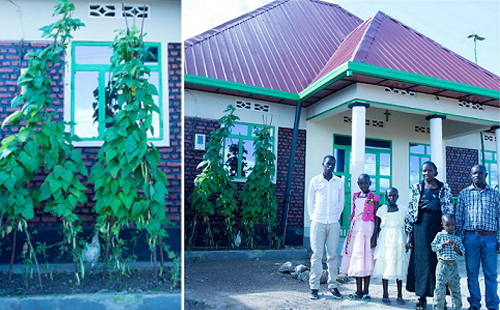Rwandans love beans. They say of their favorite staple: “a meal without beans is like no meal at all.” Like other Rwandans, 45-year-old Jean Damascene Habimana loves beans. But, for Habimana and his family of eight, a house without beans is also, quite literally, like no house at all. Their impressive new house in the eastern district of Nyagatare is named after a variety of beans that has brought them unprecedented wealth.
Five years ago, Habimana’s family was no different from most other farming households across Rwanda. They grew beans and other crops on their small farm, but the harvests were often average or poor, allowing for subsistence and nothing more. Then a program promoting a new variety of more nutritious beans entered the picture, and the Habimana household’s fortunes have never been the same since.
The new beans contained more iron than the other varieties commonly grown and eaten in the country—enough iron, in fact, to provide up to half of a consumer’s requirements. They were also higher yielding, resistant to viruses, and heat- and drought-tolerant. HarvestPlus, the organization promoting the iron beans, enrolled Habimana in the program and taught him the nutritional benefits of the beans and the best way to grow the crop for maximum harvests.
Habimana listened and learned. Today he is reaping the rewards. While previously he could expect no more than two metric tons of beans from his five-acre farm, now he harvests up to seven metric tons of iron beans. That is more than enough to feed his family, and therefore he sells the considerable surplus to HarvestPlus to allow the program to reach more farmers with the crop.
The income that Habimana is earning allows him to better provide for his family. Now, for instance, he can comfortably pay tuition for his seven children. He has also expanded his farm to 15 acres, and bought a truck. But, perhaps the biggest symbol of the family’s changed fortunes is the beautiful, more spacious house that they have moved into. Prominent in front of the house is a couple of climbing iron bean stalks. Habimana says they serve to remind him, and his neighbors, of the impact the beans have made on his family’s life.
“Iron beans are always planted in front of our house. They are the reason we now have a house we proudly call home. I also want them to be a testament, to my neighbors and everybody else, that there are great benefits to adopting iron beans.”
